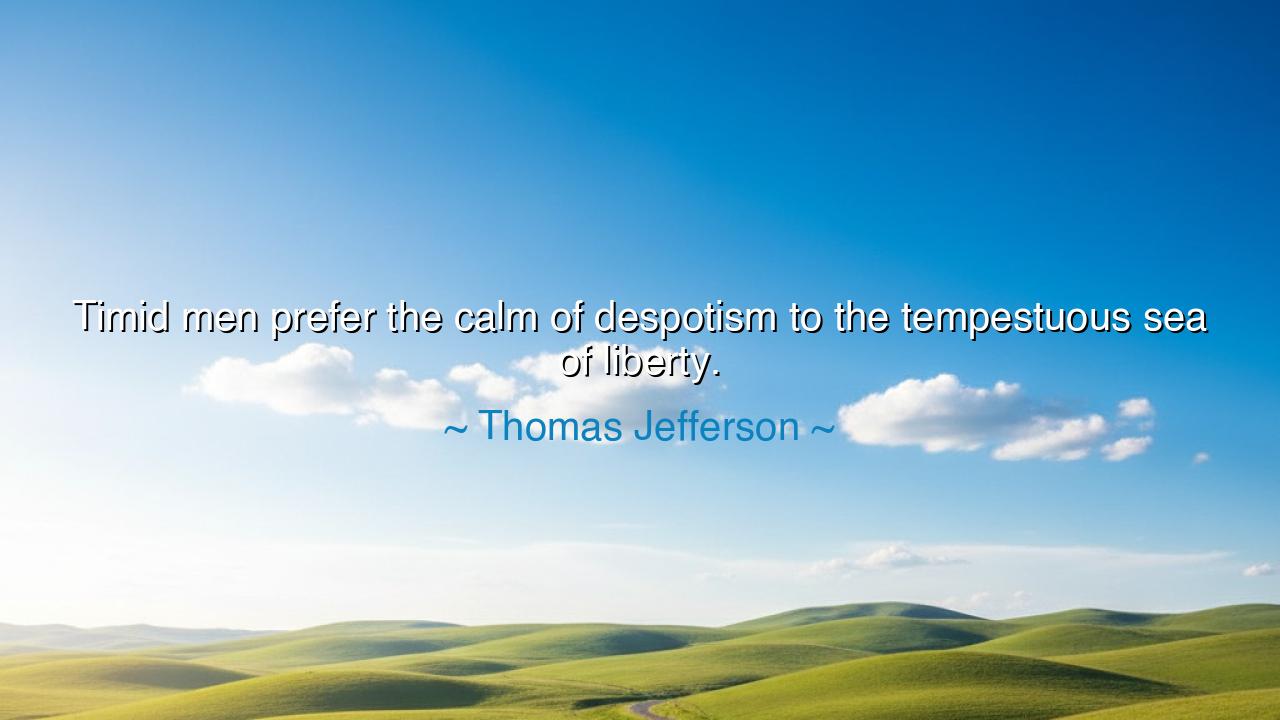
Timid men prefer the calm of despotism to the tempestuous sea of






"Timid men prefer the calm of despotism to the tempestuous sea of liberty." — these words by Thomas Jefferson offer a profound reflection on the nature of freedom, courage, and the human spirit. Jefferson, a visionary who understood the intricate balance between order and chaos, was warning us of the perils of complacency. His words capture a timeless truth about human nature: some, faced with the demands of freedom and the uncertainty it brings, will choose the safety of despotism—the false calm of a controlled, authoritarian rule—over the turbulent and often uncomfortable waters of liberty. Yet, Jefferson’s vision was clear: true freedom comes not in the absence of struggle, but in the courage to face it.
In the ancient world, great thinkers like Socrates and Plato grappled with the tension between order and freedom. In Plato’s Republic, he imagined an ideal society governed by philosopher-kings, those who would provide justice and stability for the people. Yet, even in his vision, Plato acknowledged the importance of freedom of thought—the very essence of human dignity and purpose. It was not the calm of despotism that he revered, but the tumultuous pursuit of truth. Socrates, for all his questions and challenges to Athenian society, was put to death for his ideas. He chose the tempest of liberty over the false calm of an unchallenged, tyrannical order, just as Jefferson later championed the cause of liberty for all people.
Jefferson’s words resonate particularly when we look at the struggles of the founding fathers as they forged a nation built on the principles of freedom. They knew that liberty was not easy, and that to govern by democracy would always involve challenges, conflict, and moments of uncertainty. They could have sought the security of a monarchy, as many European nations had done, with the calming certainty of a single ruler. But they understood that true greatness, true human fulfillment, comes not from quiet submission to authority but from the striving toward a system where the people hold the power—a system that would create a constant, sometimes stormy, but ultimately just society. In choosing freedom over the calm of despotism, they faced not only the tempest of war but the ongoing challenge of ensuring that liberty would not be eroded by those who sought to take the easy way out.
Consider the example of Cincinnatus, a Roman statesman who was asked to take power during a crisis, and when the crisis ended, he voluntarily gave up the power and returned to his farm. His story was one of choosing the storm of liberty—of serving the people without clinging to absolute power. He understood that true freedom was about the willingness to allow others to share in the responsibility of governance, and that the temptation to hold onto power could lead one away from the ideals of liberty and into the calm but ultimately corrupting embrace of despotism. Like Jefferson, Cincinnatus recognized that the peace of tyranny was not worth the price of surrendering the rights of individuals.
Timid men, as Jefferson called them, are those who seek comfort and security at the cost of their freedom. In every age, these men choose the ease of submission to authority rather than the turbulence that comes with self-determination. History is replete with such figures, individuals who prefer the safety of tyranny, where their lives are dictated by the whims of a ruler, over the unpredictability and risk of liberty. Consider those in Nazi Germany, who, under the influence of Hitler, embraced the order and safety promised by an authoritarian regime, even as it led to injustice and the suppression of human dignity. Their choice was to live in the false calm of tyranny, unaware of the devastating consequences of abandoning freedom for security.
The lesson from Jefferson’s words is clear: true freedom comes with responsibility, and it is far more difficult to embrace than the false promises of safety provided by despotism. To embrace liberty is to accept the chaos of self-governance, the struggle for justice, and the turmoil of constantly questioning whether we are doing right by one another. Freedom is not the absence of conflict but the engagement with it, the willingness to stand up and fight for what is just, knowing that it may be a tempestuous battle. It is a call to courage, to resilience, and to fortitude in the face of uncertainty.
In our own lives, let us consider where we stand. Are we willing to face the turbulent waters of liberty, or do we seek the safety of despotism in our personal, professional, and social lives? When confronted with oppression, or when faced with the possibility of challenging authority, do we shrink back in fear, or do we stand firm in the conviction that liberty, however tempestuous, is worth the struggle? The lesson here is one of courage and integrity—to choose the storm of freedom rather than the false calm of subjugation, knowing that in the struggle lies the true meaning of human dignity and progress.






AAdministratorAdministrator
Welcome, honored guests. Please leave a comment, we will respond soon